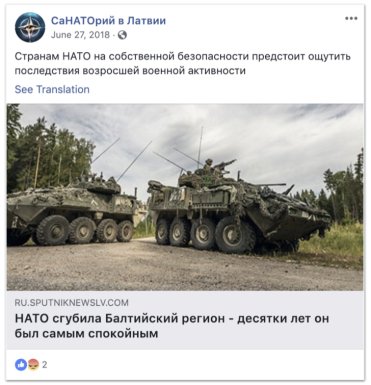These accounts operated in the Baltics, Central Asia, the Caucasus, and Central and Eastern European countries, Facebook reported.
"The Page administrators and account owners primarily represented themselves as independent news Pages or general interest Pages on topics like weather, travel, sports, economics, or politicians," Facebook said.
"Despite their misrepresentations of their identities, we found that these Pages and accounts were linked to employees of Sputnik, a news agency based in Moscow, and that some of the Pages frequently posted about topics like anti-NATO sentiment, protest movements, and anti-corruption," the company said.
According to Facebook, these pages and accounts had at least 790,000 followers and had spent an amount of money equivalent to $135,000 on advertising from 2013 to 2019.
These pages also hosted about 190 events, with up to 1,200 people expressing interest in at least one of these events.
The same incident has been examined by the Atlantic Council's Digital Forensic Research Lab, which adds very interesting information about the ways in which Sputnik stories were disseminated on Facebook.
BREAKING: Facebook just took down a major network of fake pages run y Sputnik employees in the former USSR.
— DFRLab (@DFRLab) January 17, 2019
Read our analysis here: https://t.co/vEaJc0e2sT
You can read the full analysis by Nika Alekseyeva at the DFR Lab blog page.




























